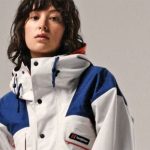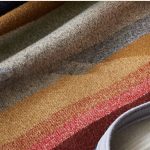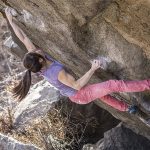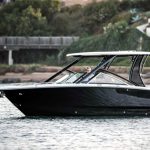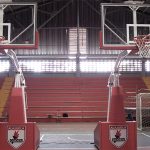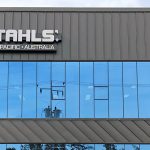Quiksilver, Inc.'s earnings improved sharply in the third quarter as belt tightening and reduced markdowns helped overcome sagging revenue. Pro-forma consolidated income from continuing operations reached $12.5 million, or 8 cents a share, more than triple the $3.7 million, or 3 cents per share, earned in the year-ago quarter.
Results exceeded Wall Street's average estimate of 4 cents. Sales declined 12% to $441.5 million for the quarter.
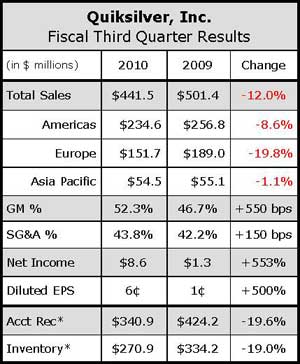
Pro-forma results in the latest quarter excludes $2.6 million of asset impairment charges and $1.8 million in restructuring charges, consisting primarily of lease loss accruals. Including these amounts, income from continuing operations was $8.2 million, or 5 cents per share, compared to $3.4 million, or 3 cents, a year ago. Results from continuing operations for all periods exclude the results of the Rossignol wintersports business, which was sold in November 2008 and is reported as discontinued operations.
In the Americas, sales decreased 8.6% to $234.6 million with contraction in the wholesale channel being slightly offset by modest growth in owned-retail stores. Quiksilver brand revenues were up modestly in the quarter, according to comments from Joe Scirocco, CFO and COO, on a conference call with analysts.
DC Shoes “were down somewhat” although the business remains strong with core skate accounts. Roxy's decline “was consistent with the continued challenges that the juniors business represents for us and for our peers in the industry,” said Scirocco.
On the positive side, operating income in the region catapulted to $27.7 million, or 11.8% of revenues, from $4.5 million in the prior-year period. Gross margin improved 900 basis points to 46.7% of sales from 37.7% of sales in the year-ago fiscal third quarter.
The company's retail comps in the U.S. were again modestly positive in Q3, marked by strong in-store gains in the Quiksilver and DC brands for the second consecutive quarter. Twelve underperforming company-owned retail stores were closed in the Americas since the end of Q3 2009, including two closed in the third quarter this year.
European region revenues fell 19.8% to $151.7 million in Q3 and were down 11% in constant currencies, roughly in line with prior expectations. Declines were seen in all three major brands. Retail comps in Europe were down in the mid-single-digits on a percentage basis for the quarter. Operating income in the region slumped 37.5% to $15.6 million, although gross margin expanded 310 basis points.
In the Asia/Pacific segment, revenues dipped 1.1% to $54.5 million while decreasing 10% in constant currencies, primarily due to market weakness in Australia. The region showed an operating loss of $1.6 million in the period versus a profit of $2.3 million in fiscal Q3 a year ago. A net of 37 shops were opened in the past year and retail now accounts for 40% of revenues in the region.
On the call, Chairman, President and CEO Bob McKnight, said the Quiksilver brand saw a strong response to its Cypher Diamond Dobby board shorts that began arriving in June. A strategy of associating premium team riders with particular styles of board shorts, such as Dane Reynolds' Brigg style, “is working very well.”
Wear-now items, including walk shorts, wovens, tee shirts, lycra, sandals and the aforementioned board shorts sold well. The August launch of a Quiksilver Girl, featuring a more classic appeal than Roxy, has received “very positive feedback.”
Regarding Roxy, McKnight said the juniors market “continues to be a challenge for branded girls' surf apparel.” For fall 2010, backpacks, dresses and swimwear have seen strength for Roxy while its younger Roxy Girl line saw improvement early in the back-to-school season.
McKnight noted that DC's sales to core action sports retailers grew more than 20% in fiscal Q3, helped by a refocus on establishing the brand as a leader within the skate shop community. Demand for products from its multi-logo TeamWorks collection featuring action sports athletes such as professional rally driver Ken Block “has grown even stronger in the third quarter.”
Overall gross margin improved 560 basis points to 52.3% of sales as inventory controls led to significantly lower levels of discounting and clearance sales.
Pro forma SG&A expenses in Q3 were reduced by $7 million in constant currency although it included $1.9 million in restructuring charges, mostly related to the relocation of DC's facilities from Vista, CA to it’s HQ location in Huntington Beach.
Quiksilver also said it reworked terms of a $150 million credit line with Bank of America and GE Capital. The interest rate on the credit line was cut by about 150 basis points while commitment fees to keep the unused line of credit open were cut by 50 basis points. The reworking came after a debt-for-stock swap by Quiksilver in August.
Looking ahead, fourth quarter revenues are expected to be down approximately 15% after accounting for a weaker translation rate of the euro and the marked decline in consumer demand in the Asia-Pacific region. Scirocco expects each brand's performance in the fourth-quarter to largely follow recent trends. The Quiksilver brand is expected to be down mid-single-digits globally. DC “continues to perform well” while Roxy remains the “toughest business,” with the majority of declines in the U.S. Sales in the U.S. and Asia-Pacific are expected to be down as QUIK has tightened up distribution to reduce clearance sales. GM is expected to improve between 400 and 450 basis points in the quarter. Pro forma operating expenses are expected to be as much as 7% lower. EPS is expected to come in the mid-single-digit cents range.




